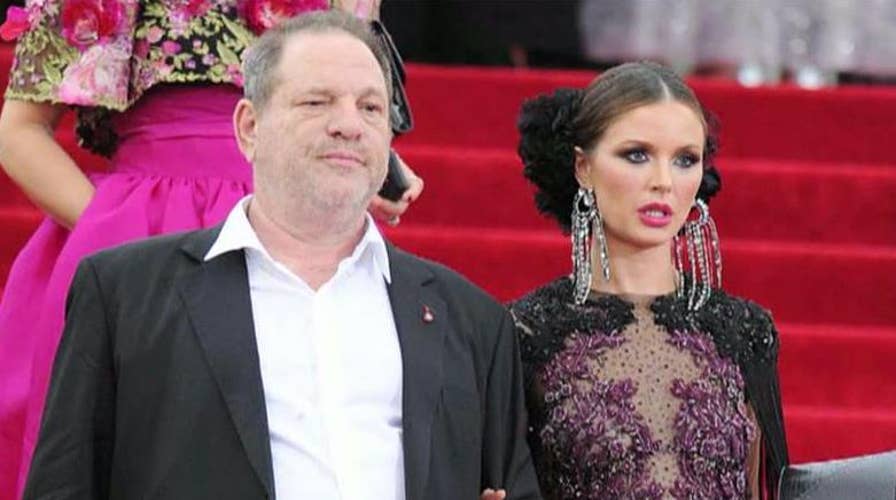Hollywood sex scandal expands beyond Harvey Weinstein
Growing list of women coming forward; reaction and analysis on 'The Five'
In the wake of the avalanche of information about Harvey Weinstein, and other perverted predators in Hollywood, the reaction from some quarters has been angry resignation that well, all powerful men behave this way. Not the rape part necessarily, and sure, not every man defiles nearby plants as Weinstein is accused of doing, but certainly all men are capable of sexual harassment and the ones with any power are likely to act on it. In short, as people in the Twitterverse routinely put it, “men are trash.”
The phrase “not all men” has become an Internet meme that feminists use to mock men who defend themselves against these kinds of mass accusations. Plainly, “not all men” are rapists or sexual harassers or predators like Weinstein--but when men try to say so they get shut down with an “oh yeah, not all men” eyeroll.
After Weinstein, though, the line the left is pushing is “yes, all men.” Shaun Lau, host of the “No, Totally!” podcast tweeted that and added “To masculine domination, non-consensuality is a feature, not a bug. Power requires neither permission nor forgiveness.” Writer Paraic O'Donnell tweeted “Yes, all men. In some degree, in some capacity, at some remove. Yes. Now, shut the f*** up, and try to make the world just, safe and kind.”
These are both men who believe that “all” men behave this way, presumably including themselves.
Here’s an easy way to tell that this “yes, all men” is deflection: When the Donald Trump “Access Hollywood” tape was released last year, few argued that “all men” do this. Feminists didn’t go on TV to say that Trump was part of a wider culture that abuses women in this way.
What’s strange about this reaction is that there is plenty of specific blame to go around. From Weinstein himself, to his board, to actors like Ben Affleck who allegedly knew it was happening but took no action. But why then extend this blame by saying this is something that all men, or even just all powerful men, do?
For instance, USA Today ran a column headlined “Changing a culture of sexual violence starts with men,” while Variety magazine went with “Men must step up to change the Hollywood culture that enabled Harvey Weinstein.” But if all men behave like this, why would any step up to make the needed changes? “You’re a potential rapist, prove us wrong” seems like a strange tack for women to take if they’re looking for men to be their allies.
Then there’s the viral video of actress Emma Thompson, talking about the Weinstein case. She shrugs that the news didn’t surprise her at all, that what happened is “endemic to the system” and that it’s actually a “crisis in masculinity.” The Guardian also ran a column on how “the fall of Harvey Weinstein should be a moment to challenge extreme masculinity.” This eagerness to spread blame beyond the perpetrator, to all men, to all of society, lets these awful men off the hook. It’s not them, it’s the culture of “extreme masculinity!”
That’s the real problem with casting this wide net to include all men in this atrocious behavior. It ends up giving a pass to the predators. After all, the first excuse Weinstein trotted out when the story broke was “I came of age in the ‘60’-s and ‘70’-s, when all the rules about behavior and workplaces were different. He was trying to plead that it’s bigger than him, almost not really his fault. But why would women, or their alleged allies, parrot that line?
Here’s an easy way to tell that this “yes, all men” is deflection: When the Donald Trump “Access Hollywood” tape was released last year, few argued that “all men” do this. Feminists didn’t go on TV to say that Trump was part of a wider culture that abuses women in this way. No, they accurately said that this behavior is not something all men do. Trump called it “locker room talk” – as if all men talk like that-- but plenty of men and women were quick to correct him that there was nothing normal about his words.
We can’t hold all men accountable for something that only some men do. Even the pressure to speak up when they see harassment shouldn’t be just on them. This cone of silence extends beyond men. Jane Fonda, for one, admitted that she had known about Weinstein, but never said anything. Fonda, co-founder of the “the Women's Media Center” said she feels ashamed that she didn’t say anything. She should. And so should every man and woman whose silence enabled him.
Over the weekend the heart-breaking trending topic #metoo showed just how many women have been sexually harassed and assaulted. The seriousness of this problem is exactly why we shouldn’t blanket accuse all men. Saying “not all men” is not only accurate but also a good way to keep the focus on the men who do hurt women. Maligning half the population as exploiters of women mixes in the bad guys with the good ones--and it’s the Weinsteins of the world who benefit.









































